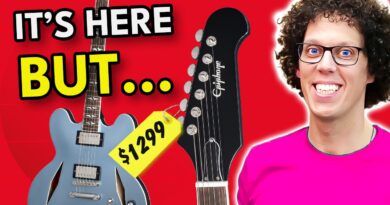Guitar Amp Myths Part 2 – Why Wattage is NOT a good measure of how loud your amp will go!
Head over to the Andertons website to find the products in the video! | https://tinyurl.com/27gsswfq
Electric Guitar Department | https://tinyurl.com/2ah7ele5
Acoustic Guitar Department | https://tinyurl.com/23tr727d
Bass Department | https://tinyurl.com/24yqm6sy
Guitar Pedal Department | https://tinyurl.com/287hdxhq
Amp Department | https://tinyurl.com/28vnqtu5
The links below may be outdated, use the links above to start browsing the website.
???? Captain Anderton recently caught up with Blackstar senior engineer Paul to tackle one of those big questions, will higher wattage give you more volume?
Let us know what you think in the comments!
This is a 4 part series… Part 3 is out next Saturday.
Blackstar range: https://goo.gl/MzuvVq
Interested in other Andertons YouTube channels? Click on one of these links to find out more…
Andertons Guitar & Bass YouTube Channel: https://goo.gl/kRJCpb
Andertons Drummers YouTube Channel: https://goo.gl/9yKSS9
Andertons Keyboard YouTube Channel: https://goo.gl/ns172M
Andertons Music Tech YouTube Channel: https://goo.gl/Pmy8Ao
Andertons Shopping Web Site: https://goo.gl/TPsG2Q
Buy a T Shirt: https://goo.gl/TrTe78
Make sure to subscribe to Andertons TV for more great videos like this: https://goo.gl/aAzyQM
#Guitar #Amp #Myths #Part #Wattage #good #measure #loud #amp
Originally posted by UCSNxIry_FPFcQDFRbi3VOAw at https://www.youtube.com/watch?v=XU7CTcrrmbE




I'm perfectly happywith my JC-120 but I cannot easily get it from my first floor flat down the stairs to ever actually use it. So I need something that is as loud but lighter.
Yes can it put the drummer in fear of his life, for instance JC-120 loud
take your 1W/1M speaker sensitivity, add 3 per doubling of speakers.
then count up to your wattage 2, 4, 8, 16, 32, 64, 128 but stop short of your wattage and count, ( eg 32 watts for 40 = 2, 4 , 8, 16, 32 = 5 ) then you take that number, ( eg. 5 ) x3db = ( eg.15db ),
then add that to your 1W/1M speaker sensitivity = max RMS db
that put me at 114 to 115 db … barely adequate i thought …but like he says, compression really punches it up….i basically added a solid state "tube amp", and Wow !!!
Speaker Sensitivity … and how many of them …. without that, wattage means nothing in and of itself.
but good mention of compression.
i have a 40 watt solid state amp, hot rodded the speakers, but when i started adding pedal compression, it was like going from 114db to pushing 120db ( Tech 21 Mop Top Liverpool )
The 7 watt Katana Mini sounds so much better than a 20 watt Frontman
Great stuff. Thanks.
going by the logic that 20w is about half the volume of 100w, then you divide/multiply the wattage by 5 to see how many watts double the volume would be
half the volume of a 20w amp would be 4w
double the the volume of a 5w amp is 25w etc
idk, just guessing, i may be completeley wrong
I went back and paused the video at 00:21 just to re-read Paul’s credentials…yeah, I’m listening closely!
Incredbily clear and informative talk from Paul here – understand more in 12 minutes about how amps work than I did after playing half my life!
my ex 20 watts Engl Rockmaster head was not loud enough to battle the analogue drums …
if you wanna play live you need 50 watts
I have that Blackstar on the bottom. It's 120 watts. And not loud at all. By comparison I have a 50w JCM 800 that would totally destroy it at much lower volume settings.
Well I think most of what is said here is accurate. One exception is the conversation of quality of speakers and speaker sensitivity spl db ratings. It is stated in the video that speakers with higher spl db ratings are higher quality than those with lower spl ratings. This is incorrect. In fact, many very high end, hiqh quality speakers have lower spl ratings in the 86 spl db range for example. For example, a Morel TiCW 1058Ft Titanium Series 10" Subwoofer 8 Ohm driver is rated at 86 spl db is rated to handle 600watts RMS and sells for $650. Are you saying this speaker is low quality?
What you did say that is accurate, is that the speakers with higher spl db ratings are more efficient and in that sense take less power to drive them compared to speakers with lower spl db ratings. Speakers with lower sensitivity ratings when driven with adequate power will actually have a high quality sound. In addion, it is often quite difficult to find larger mid-bass drivers/woofers that have higher spl ratings, not because higher spl rated speakers are higher quality but inherently the larger drivers by design just require more power to move the larger mass cone surface area, larger voice coils, larger magnet etc. So typically you will find your higher frequency drivers such as your tweeter most commonly have spl rating at over 91 db, while you lower frequency drivers are more typically made with lower spl ratings. That doesn't mean you can't find a tweeter with an spl rating of 84 db or a woofer with one of 91 db but generally what I am saying is true. The whole idea that speakers with higher spl rating are higher quality or sound better is incorrect. In fact, many of the speakers I've auditioned with lower spl rating seem to sound better and are typically more expensive. They just require more power to produce quality sound. So really spl sensitivity in speaker has nothing to do with quality, but it is simply a reflection of how efficient the speaker reacts to any given power input.
Man, Rob looks a little different in this video.
This person, I want to hear hours of this info!!
Is Blackstar going to launch a good quality solid state amp, similar to Peavey and Orange?
Great video, thanks for the info! I understood maybe 5% of this but it tells me that valve or solid state is important to consider and you don't need a $1500+ amp head and $1000 cabinet to perform live at a gig
wow so let's bullshit, and to double the Loudness, try it is 10db NOT 3, wow, and RMS is the Root Means Square where Peak is the Actual Peak, wow, they need to put down the Pipe, between talking
Wow! Very informative and interesting!
I still think that wattage is the "easiest" way to estimate the loudness. Why?
1) Bass amps usually have more watts than guitar amps because our ears are less sensitive to low frequencies, therefore need more watts to make bass louder.
2) When someone says 20watts can keep up with a drummer, they're usually talking about the cranked distorted sound. In my gigging experience, at least 50watts is needed for clean tones in small club gigs.
3) You would never use a 100watt in your living room because it's too loud.
4) This is an exaggeration, but FOH speakers in large arena concerts need thousands of watts for it to be loud.
5) A dedicated 1 watt amp can push headphones louder than the few miliWatts output of smartphones.
Double the number of speaks and gain 3db was my old knowledge from my car audio days.
Double the power or double the speakers to gain 3db.
A 50-60 watt SS amp with one 12" super efficient (High SPL rating 98-99) speaker should be enough to gig with these days..just mic it up and you should be fine…
If not…check with you P.A. guy and your drummer
A 50-60 watt SS amp with one 12" super efficient (High SPL rating 98-99) speaker should be enough to gig with these days..just mic it up and you should be fine…
If not…check with you P.A. guy and your drummer
For a second I thought you were about to tell the story of “The little valve amp that could”
when looking at the specs for an amp, I see the following:
Supply Voltage
Max Power Consumption
and
Output Power Rating.
Which of these 3 specs tell me how loud an amp will be?
No 100 watt solid state amp in history is as loud as an 85 watt twin reverb.
Great, helpful video. And I dig Blackstar amps. I have a 15 watt Fender Bassbreaker. I run it on the cleanest setting and put a great fuzzbox in front of it. It's more than loud enough to keep with with a very loud drummer I work with. Love it just fill the room. But I don't even have to turn it up loud. You work well with the soundman and put the mic in the right spot and it can be on 2 and it will sound like a wall of twenty Marshall stacks. I learned these tricks in my very early guitar career in the 80s when I started playing gigs on the Sunset Strip. I stopped lugging my Marshall stack and started using combos. I had a far better sound than any other players. The soundmen were always happy when I was giging because I was very easy to work with. I'd either use a Boogie combo, a Peavey, Marshall, or any number of Fenders I borrowed, like Deluxe Reverbs which are an excellent pedal platform. Don't get me wrong, a 100 watt stack has its place, but you can do most of what you need with a 20 watt, or in my case 15 watt amp. The speaker makes a big deal. I will not use anything but a 12 inch. As for brand, I keep an open mind. But 10 inch speakers just don't deliver.
My biggest question do i need an amp with higher wattage to satisfy distorion pedals
Science bless you.
Thank you!!!
This is a great mini series… very informative …. loved it ????????
For easy reference amps should have a graphic "Neighbour Rating", like
???? ????????????
Much appreciated!
This ain't bad. I'm kinda following it.
I just wanted to know why tubes seem louder than solid state. Waiting for someone to play through the amp
Would you not think though any amp from 5 watt too 100+ would be loud enough if mic'd up properly through a powerful pa system ??
A 4 x 12 cab speaker pattern will tend to cause phase cancellation off to the sides making it extremely loud on axis. It is more of a "long throw" cab making them incredibly uneven at the front row although deafening to the person with the speakers pointing at their head. If you could fly 4 x 12 cabs and aim them towards the back half of the audience there would be less problems, although this is usually why it is better to run them at low volume and mic through a PA. At 1 watt, a 4 x 12 is already competing with a softer drummer.
Solid state amps will sound like a wet fart if you overdrive the power stage, so the last stage is usually just to cleanly amplify any other effects or overdrive – functioning like a PA system rather than an effects.
Valve amps will sound quite good if you overdrive the power stage.
If both amps put out the same level at say 1% THD then the valve amp has more usable nice sounding but not necessarily linear output.
This dude's not at all impressed with Lee's humor
Tube amps cut thru the mix better requiring less "Sound Pressure Level" to be heard in a live situation.
I NEVER knew that about SPL vs. Output power. Thank you! Very informative. BTW: I already own the HT Club 40 MK II. Does anyone have an opinion on the pre-loaded Cel 70/80? Would I really notice a sig difference in a V-30? Prob yes, but like to hear from someone who's done it?
So true heck my 1 watt Vox mini G2 amp is loud and even my 20 watt ENGL Ironball sounds massive and can get LOUD as heck on a 1×12 cab.
He lost a great opportunity to say that 4 blackstar speakers would sound louder than 4 marshalls
Wattage does not come from voltage amplitude squared over the load. It's current squared times the load ????
Love my fender mustang gt 100 at any sound level
So… In practical application you'll never want a speaker that is painful to listen with the least power, because that won't open up the valve amp? If you have a really loud tube amp you might actually want that inexpensive (hopefully still good sounding) lower SPL speaker to tame the amp a bit and to be able to drive it with more volume without hurting your ears?
Like most people agree that Marshall Plexi is supposed to be run at very loud volumes to get a good sound, so you might want more inefficient speaker to get that out without destroying the building?
I'm still trying to perfectly dissect the relationship between the amp's and speaker's, ohm and wattage friendship with one another, and now we're introducing volume and sensitivity to the equation?!
I'm pretty certain I just blew a few brain cells!
Do you lads offer repair service on that kinda thing?